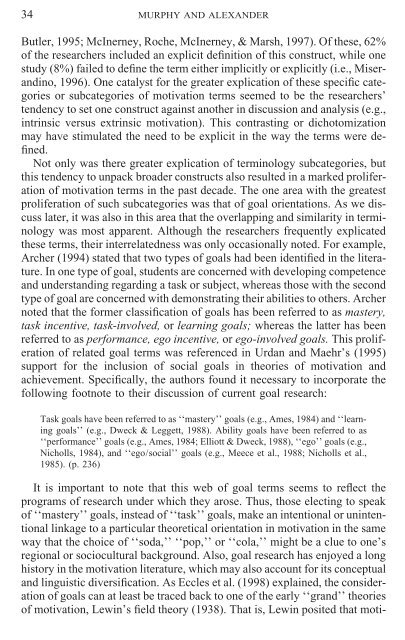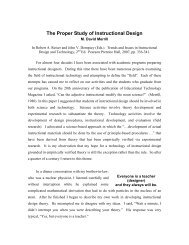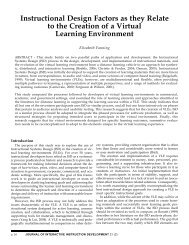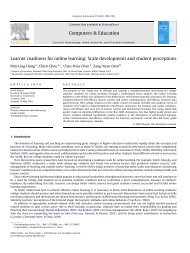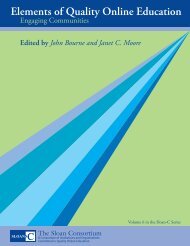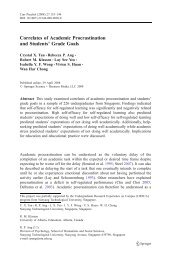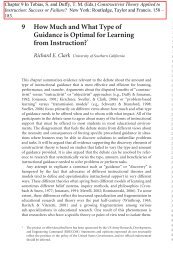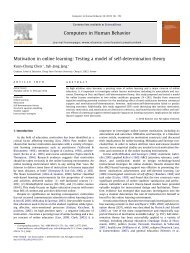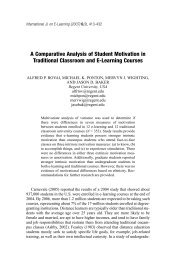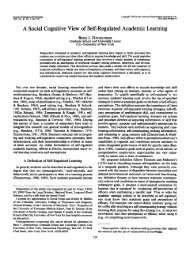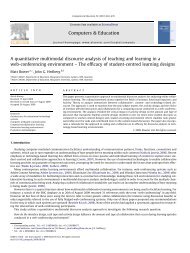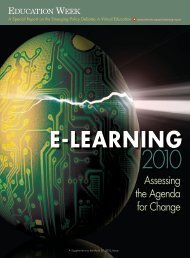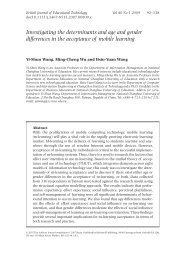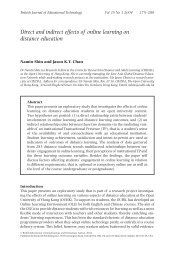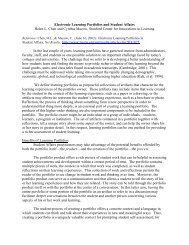A Motivated Exploration of Motivation Terminology - Anitacrawley.net
A Motivated Exploration of Motivation Terminology - Anitacrawley.net
A Motivated Exploration of Motivation Terminology - Anitacrawley.net
Create successful ePaper yourself
Turn your PDF publications into a flip-book with our unique Google optimized e-Paper software.
34 MURPHY AND ALEXANDERButler, 1995; McInerney, Roche, McInerney, & Marsh, 1997). Of these, 62%<strong>of</strong> the researchers included an explicit definition <strong>of</strong> this construct, while onestudy (8%) failed to define the term either implicitly or explicitly (i.e., Miserandino,1996). One catalyst for the greater explication <strong>of</strong> these specific categoriesor subcategories <strong>of</strong> motivation terms seemed to be the researchers’tendency to set one construct against another in discussion and analysis (e.g.,intrinsic versus extrinsic motivation). This contrasting or dichotomizationmay have stimulated the need to be explicit in the way the terms were defined.Not only was there greater explication <strong>of</strong> terminology subcategories, butthis tendency to unpack broader constructs also resulted in a marked proliferation<strong>of</strong> motivation terms in the past decade. The one area with the greatestproliferation <strong>of</strong> such subcategories was that <strong>of</strong> goal orientations. As we discusslater, it was also in this area that the overlapping and similarity in terminologywas most apparent. Although the researchers frequently explicatedthese terms, their interrelatedness was only occasionally noted. For example,Archer (1994) stated that two types <strong>of</strong> goals had been identified in the literature.In one type <strong>of</strong> goal, students are concerned with developing competenceand understanding regarding a task or subject, whereas those with the secondtype <strong>of</strong> goal are concerned with demonstrating their abilities to others. Archernoted that the former classification <strong>of</strong> goals has been referred to as mastery,task incentive, task-involved, or learning goals; whereas the latter has beenreferred to as performance, ego incentive, or ego-involved goals. This proliferation<strong>of</strong> related goal terms was referenced in Urdan and Maehr’s (1995)support for the inclusion <strong>of</strong> social goals in theories <strong>of</strong> motivation andachievement. Specifically, the authors found it necessary to incorporate thefollowing footnote to their discussion <strong>of</strong> current goal research:Task goals have been referred to as ‘‘mastery’’ goals (e.g., Ames, 1984) and ‘‘learninggoals’’ (e.g., Dweck & Leggett, 1988). Ability goals have been referred to as‘‘performance’’ goals (e.g., Ames, 1984; Elliott & Dweck, 1988), ‘‘ego’’ goals (e.g.,Nicholls, 1984), and ‘‘ego/social’’ goals (e.g., Meece et al., 1988; Nicholls et al.,1985). (p. 236)It is important to note that this web <strong>of</strong> goal terms seems to reflect theprograms <strong>of</strong> research under which they arose. Thus, those electing to speak<strong>of</strong> ‘‘mastery’’ goals, instead <strong>of</strong> ‘‘task’’ goals, make an intentional or unintentionallinkage to a particular theoretical orientation in motivation in the sameway that the choice <strong>of</strong> ‘‘soda,’’ ‘‘pop,’’ or ‘‘cola,’’ might be a clue to one’sregional or sociocultural background. Also, goal research has enjoyed a longhistory in the motivation literature, which may also account for its conceptualand linguistic diversification. As Eccles et al. (1998) explained, the consideration<strong>of</strong> goals can at least be traced back to one <strong>of</strong> the early ‘‘grand’’ theories<strong>of</strong> motivation, Lewin’s field theory (1938). That is, Lewin posited that moti-


